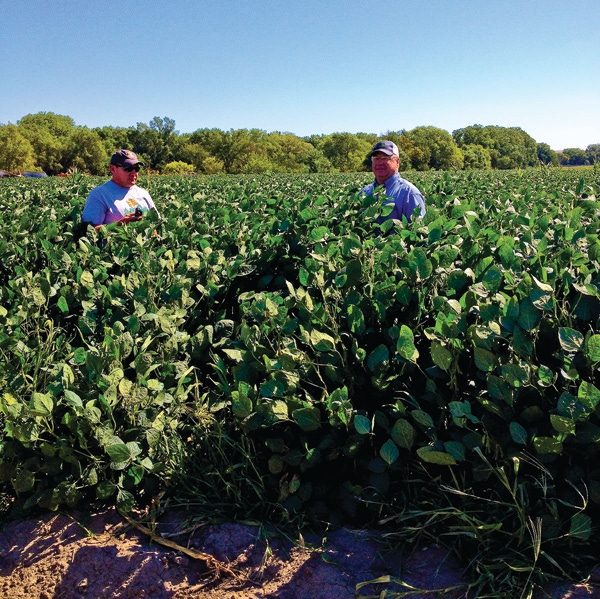February 1, 2013

The global market for biologicals is between $1.4 billion and $1.6 billion and is projected to grow to approximately $3 billion by 2020, according to the industry analysis firm Frost & Sullivan. While there is confusion over the product category itself, which includes biorationals, biostimulants and biopesticides, there is no dought it will grow.More biological products, like those mentioned below, are being incorporated into conventional corn and soybean farming as part of a pest management and/or plant health program.
Valent BioSciences Corporation (VBC), Libertyville, Ill., expects to launch a new product for corn based on its proprietary plant growth regulator (PGR) technology. “We are already working on expanding the silage corn label to include all corn types as well as a label extension for small grains within the next few months,” says Mike Donaldson, president, VBC.
“We continue to make progress on other products that can impact drought resistance and root growth, using proprietary plant growth regulators and microbials,” Donaldson adds. “We plan to promote some of the projects to full development programs in 2013.”
Also planned is the gradual expansion of products that are similar to BioNik in corn to canola, sorghum and sunflowers. VBC developed its BioNik PGR to delay germination and synchronize the flowering of male and female parents in seed corn production. “Beginning this year, every major seed company will be gradually integrating BioNik into their program as they learn more about how it adds value to seed corn production protocols,” Donaldson says. The PGR eliminates some inefficiencies and costly production practices in seed production.
The widespread drought in 2012 has prompted companies to intensify their efforts in managing water uptake. VBC, for example, is testing variations of Abscisic acid (sABA is the active ingredient in ConTego), which has been used to manage water uptake in ornamental plants. It will be tested on corn and soybeans this year. sABA is known to occur naturally in many plants and is involved in plant stress mitigation.
Marrone Bio Innovations (MBI), headquartered in Davis, Calif., expects its new manufacturing facility in Bangor, Mich., to begin production in mid-year 2013 of Grandevo, its broad-spectrum bioinsecticide. Grandevo is currently used in the citrus and vegetable markets. Trials in 2012 on soybeans showed good activity on kudzu bug and Lygus on cotton stand-alone, says Pam Marrone, the company’s founder and CEO.
Meanwhile, MBI will continue testing Regalia biofungicide in 2013. Regalia has been developed to provide protection against Rhizoctonia, Pythium, Phytophthora and Fusarium. Despite the extremely dry conditions last summer, the company collected good test data, Marrone says. She adds that over the last four years, soybeans treated with the biofungicide in a tankmix with leading chemicals averaged 3.5 bu./acre more than chemical-only treatments. These tests were conducted in Illinois, Iowa, Indiana and Nebraska as well as in Arkansas, Louisiana and Mississippi.
Similar yield trends were observed in corn tests where Regalia was added to Quadris and Headline fungicides.
MBI also will conduct testing this year of MBI 010, a biological pre- and post-
emergence, nonselective herbicide with a unique mode of action. This bio-herbicide has shown some selectivity when applied to corn postemergence, Marrone says. MBI has also been working on a bio-nematicide with broad-spectrum control, which is expected to be a good fit in row-crop production, having shown activity against soybean cyst nematode.
BASF’s acquisition of Becker Underwood was completed in November. Becker Underwood’s biologicals, polymers and seed colorants complements BASF’s crop protection product line.
The EPA currently is evaluating several Becker Underwood biologicals, and registrations for some could be issued later this year, says Russ Berndt, product manager, Becker Underwood.
Meanwhile, the company has continued to test Vault HP, a combination biofungicide and growth stimulant for soybeans. In independent trials over the last three years, it has helped improve yield on average by 4 bu./acre over non-inoculated seed.
Vault HP contains rhizobia which, as living microorganisms, need oxygen to survive. An important aspect, therefore, is a biological’s viable shelf life. Berndt points out that Becker Underwood has a packaging system to help extend the life of rhizobia. This packaging includes a gas-permeable interior lining and small exterior openings that allow oxygen to reach the product.
Meanwhile, TerraMax, Bloomington, Minn., has been able to extend shelf life of its Azospirillum product for corn, using a unique stabilizing process and media. “The average life of Azospirillum stored in packages is 18 to 24 months,” says Doug Kremer, CEO, TerraMax. This process also is used in soybean inoculant production.
Azospirillum is a nitrogen-fixing bacterium used to enhance plant growth in corn and soybeans. TerraMax offers it in planter box treatments and in liquid form.
In field trials of corn over the last three years, powdered treatments of the bacteria have helped boost yields by more than 4 bu./acre over untreated checks, Kremer says. He adds that TerraMax tested Azospirillum with several conventional seed treatments and has not observed any compatibility problems.
Finally, Loveland Products recently introduced Consensus, a new seed treatment containing three plant PGRs, including salicylic acid. Marty Robinson, seed treatment market manager, says that EPA registration of salicylic acid for seed treatment use has been the company’s goal for several years. Consensus recently received EPA registration.
The seed treatment activates oligosaccharides, vitamins and natural plant growth hormones for healthier and uniform seedlings. Chris Stickler, Loveland’s research and development director, says the treatment activates gene expression for better use of seed-stored nutrients; promote rooting for better water and nutrient utilization; and trigger systemic acquired resistance for greater plant vigor. “We see more growth above and below the ground, and great yield responses from a number of crops including rice, soybeans, cereals and cotton,” Stickler says.
Consensus will be marketed through Crop Production Services retail locations. It features low use rate, seed safety and low environmental impact, and it is considered a good companion seed treatment with other seed treatment products, such as rhizobia inoculants.
About the Author(s)
You May Also Like




